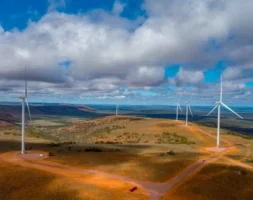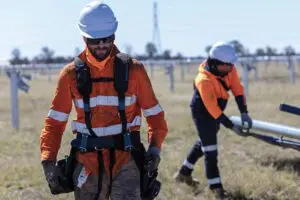I have yet to meet a climate scientist who does not believe that global warming is a worse problem than they thought a few years ago. The seriousness of this change is not appreciated by politicians and the public.
Uber-hedge fund manager Jeremy Grantham has a must-read opinion piece in the journal Nature.
Grantham is cofounder and Chief Investment Strategist of GMO (with some $100 billion in assets) — a self-described “die hard contrarian.” He is also one of the few leading financial figures who gets both global warming and growing food insecurity, two cornerstones of Climate Progress analysis. See Grantham’s piece “Welcome to Dystopia,” which explains in detail that “We are five years into a severe global food crisis that is very unlikely to go away. It will threaten poor countries with increased malnutrition and starvation and even collapse.”
Grantham’s key message to the readership of one of the world’s leading science journals is that humanity is headed pell-mell towards disaster, and scientists must speak out more:
President Barack Obama missed the chance of a lifetime to get a climate bill passed, and his great environmental and energy scientists John Holdren and Steven Chu went missing in action. Scientists are understandably protective of the dignity of science and are horrified by publicity and overstatement. These fears, unfortunately, are not shared by their opponents, which makes for a rather painful one-sided battle. Overstatement may generally be dangerous in science (it certainly is for careers) but for climate change, uniquely, understatement is even riskier and therefore, arguably, unethical.
It is crucial that scientists take more career risks and sound a more realistic, more desperate, note on the global-warming problem. Younger scientists are obsessed by thoughts of tenure, so it is probably up to older, senior and retired scientists to do the heavy lifting. Be arrested if necessary. This is not only the crisis of your lives — it is also the crisis of our species’ existence. I implore you to be brave.
Hear! Hear!
And some have heard — and are leading (see Lonnie Thompson on why climatologists are speaking out: “Virtually all of us are now convinced that global warming poses a clear and present danger to civilization”).
Here’s Grantham summarizing the dangerous path humanity is now on:
Then there is the impending shortage of two fertilizers: phosphorus (phosphate) and potassium (potash). These two elements cannot be made, cannot be substituted, are necessary to grow all life forms, and are mined and depleted. It’s a scary set of statements….
What happens when these fertilizers run out is a question I can’t get satisfactorily answered and, believe me, I have
tried. There seems to be only one conclusion: their use must be drastically reduced in the next 20–40 years or we will begin to starve.
Well, Americans probably won’t starve in that time frame, since we are the bread basket of the world, but hundreds of millions will certainly suffer needlessly.
The world’s blind spot when it comes to the fertilizer problem is seen also in the shocking lack of awareness on the part of governments and the public of the increasing damage to agriculture by climate change; for example, runs of extreme weather that have slashed grain harvests in the past few years. Recognition of the facts is delayed by the frankly brilliant propaganda and obfuscation delivered by energy interests that virtually own the US Congress. (It is not unlike the part played by the financial industry when investment bubbles start to form … but that, at least, is only money.) We need oil producers to leave 80% of proven reserves untapped to achieve a stable climate. As a former oil analyst, I can easily calculate oil companies’ enthusiasm to leave 80% of their value in the ground — absolutely nil.
What to do in such a world? Everything we can:
The damaging effects of climate change are accelerating. James Hansen of NASA has screamed warnings for 30 years. Although at first he was dismissed as a mad- man, almost all his early predictions, disturbingly, have proved conservative in relation to what has actually happened. In 2011, Hansen was arrested in Washington DC, alongside Gus Speth, the retired dean of Yale University’s environmental school; Bill McKibben, one of the earliest and most passionate environmentalists to warn about global warming; and my daughter-in-law, all for protesting over a pipeline planned to carry Cana- dian bitumen to refineries in the United States, bitumen so thick it needs masses of water even to move it. From his seat in jail, Speth said that he had held some important positions in Washington, but none more important than this one.
It isn’t just scientists who need to speak out more — all of us do.
This article was first published by Climate Progress. Reproduced with permission.









